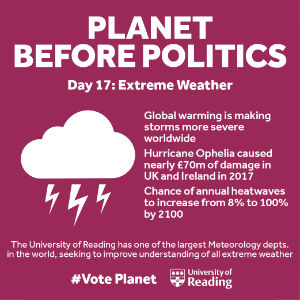#VotePlanet: Extreme weather science offers ways to prepare for impacts
25 November 2019

At a time of major environmental change, understanding and predicting extreme weather events is more critical than ever.
The University of Reading is one of the world’s leading centres for the study and teaching of Meteorology, with hundreds of scientists working to improve weather forecasting and identify the causes of potentially deadly weather events.
New Reading research is revealing previously undiscovered links between weather in the UK and regions thousands of miles away. Other studies have shed light on the factors that led to the infamous ‘Beast from the East’ that brought freezing conditions to the UK in 2018, and the heatwaves seen globally in recent years.
Professor Andrew Charlton-Perez, Meteorologist at the University of Reading, said: “Extreme weather is a growing problem for the UK and the rest of the planet. A critical part of adapting to climate change is greater understanding of the causes and consequences of these events.
“The advances Reading has made in our understanding of the weather is evidence of the world class environment for Meteorology teaching and research at the University of Reading. Our students work alongside world leading scientists to make breakthroughs in our understanding of the natural world, including during their final year undergraduate projects.”
Research at the University of Reading has provided context to extreme weather events like the record-breaking heatwaves across Europe this summer, or those in the UK in 2018 r.
Winter storms and cold snaps are now better understood thanks to Reading scientists. Research into sting jets has explained the strong winds associated with them, while a recent PhD study revealed the weather event that likely led to the Beast from the East in February 2018. This could help scientists better predict events like this in future.
Communicating uncertainty in weather and climate forecasts is another area being examined by Reading scientists. As forecasts for extreme weather events become more accurate, how we communicate what is certain and what is uncertain about them to decision makers becomes even more critical.
Reading has been pioneering an inter-disciplinary approach to the communication of weather and climate information including with colleagues in Psychology, Information Design and Politics and International Relations.
In 2019, 35 live joint projects including large European Union projects have enabled the latest Reading research to support the work of the European Centre for Medium-Range Weather Forecasts (ECMWF).
#VotePlanet
The University of Reading is exploring the biggest environmental issues facing the world in its #VotePlanet campaign, counting down to the General Election on December 12. It will also highlight how research and action at Reading is helping to combat them.
Public concern for the environment has increased significantly in recent years, with political parties unveiling various eco-friendly pledges in their election manifestos.
The #VotePlanet campaign therefore aims to inform voters on the science behind these issues, and what sustainability action it is taking as an institution.
Follow the campaign on Twitter, Facebook and Instagram, and on the University news page. Get involved and share your examples of sustainable action using the hashtag #VotePlanet.
